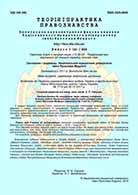Підстави самооборони міжнародних міжурядових організацій
Foundations of the self-defense of international intergovernmental organizations
Author(s): Yuri V. ShchokinSubject(s): International Law, Peace and Conflict Studies
Published by: Національний юридичний університет імені Ярослава Мудрого
Keywords: international organization; the right to self-defense; state; armed attack; peacemaking;
Summary/Abstract: The article is devoted to the study of one of the grounds for exemption from responsibility of international intergovernmental organizations - self-defense. It is provided by Art. 21 Draft articles on the Responsibility of international organizations, adopted by the UN International Law Commission in 2011. The wording of the norm significantly differs from the relevant provision providing a similar right to sovereign states. In particular, it states that “The wrongfulness of an act of an international organization is precluded if and to the extent that the act constitutes a lawful measure of self-defence under international law”. It does not have a direct reference to the United Nations Charter, which is contained in Art. 21 Draft Articles on the Responsibility of the States in 2001. Currently there are no international agreements that envisage the right to self-defense of international organizations. Consequently, the basis for its application can be only an international law custom. Defining it is a complex scientific issue.Present analysis is based on the legal nature of international organizations. It is pointed out that, unlike sovereign states, they do not have their own territory, which in the vast majority of cases is the main purpose of military attacks by aggressor countries. Consequently, the grounds for applying the right to self-defense of international organizations are quite limited. They are mainly related to the negative circumstances in which police and peacekeeping units operate acting on the mandate of the relevant international organization and on its behalf. In other cases, international organizations are protected by agreements with the states on its territory their headquarters are located, where the guarantees of their safety and integrity are expressly provided. It is pointed out that it is highly likely that some of new means of direct and indirect intervention that are already being used to interfere in internal and external affairs of states will probably be applied to international organizations in the future.
Journal: Теорія і практика правознавства
- Issue Year: 2/2018
- Issue No: 14
- Page Range: 1-14
- Page Count: 14
- Language: Ukrainian

